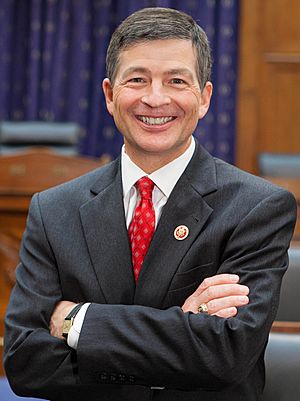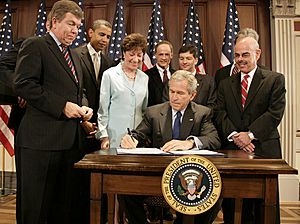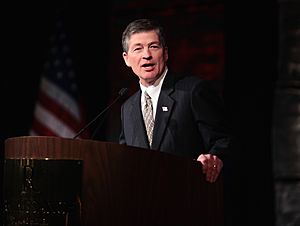Jeb Hensarling facts for kids
Quick facts for kids
Jeb Hensarling
|
|
|---|---|
 |
|
| Member of the U.S. House of Representatives from Texas's 5th district |
|
| In office January 3, 2003 – January 3, 2019 |
|
| Preceded by | Pete Sessions |
| Succeeded by | Lance Gooden |
| Chair of the House Financial Services Committee | |
| In office January 3, 2013 – January 3, 2019 |
|
| Preceded by | Spencer Bachus |
| Succeeded by | Maxine Waters |
| Chair of the House Republican Conference | |
| In office January 3, 2011 – January 3, 2013 |
|
| Leader | John Boehner |
| Vice Chair | Cathy McMorris Rodgers |
| Preceded by | Mike Pence |
| Succeeded by | Cathy McMorris Rodgers |
| Personal details | |
| Born |
Thomas Jeb Hensarling
May 29, 1957 Stephenville, Texas, U.S. |
| Political party | Republican |
| Spouse | Melissa Hensarling |
| Children | 2 |
| Education | Texas A&M University (BA) University of Texas at Austin (JD) |
Thomas Jeb Hensarling (born May 29, 1957) is an American politician. He served as a U.S. Representative for Texas's 5th congressional district from 2003 to 2019. He is a member of the Republican Party.
During his time in Congress, he led important groups. He was the chairman of the House Republican Conference from 2011 to 2013. He also chaired the House Financial Services Committee from 2013 until 2019. News outlets like the Los Angeles Times and Wall Street Journal recognized him as a key figure in economic policy.
On October 31, 2017, Hensarling announced he would not run for re-election in 2018. In 2019, he joined UBS Group AG as an executive vice chairman for the Americas region. He stepped down from that role in 2023.
Contents
Early Life and Education
Jeb Hensarling was born in Stephenville, Texas. This town is the main city of Erath County, Texas in Central Texas. He grew up on his family's farm in College Station, Texas. He has one sister, Carolyn Hensarling Arizpe. He is a member of the Episcopal Church.
Like his father, Jeb Hensarling went to Texas A&M University. He earned a bachelor's degree in economics in 1979. Later, in 1982, he received a Juris Doctor degree from the University of Texas School of Law in Austin, Texas.
Political Journey
Before becoming a U.S. Representative, Hensarling worked for Texas Senator Phil Gramm. He was Gramm's State Director from 1985 to 1989. He also managed Gramm's re-election campaign in 1990. From 1991 to 1993, he was the executive director of the National Republican Senatorial Committee.
Hensarling then worked as a vice president at two companies. In 1996, he became the owner of San Jacinto Ventures. He also served as CEO of Family Support Assurance Corporation in 2001. From 1999 to 2001, he was vice president of Green Mountain Energy.
Elections and Early Congressional Work
Hensarling was first elected to Congress in 2002. He won against his Democratic opponent Ron Chapman. He was reelected several times, winning by large margins. For example, in 2004, he won with 64% of the vote. In 2016, he received 80% of the votes.
In 2005, an article in National Review called him the country's "budget nanny." This meant he focused on how the government spends money. He wanted Congress to decide how much money they could spend and then prioritize within those limits.
After the 2006 congressional elections, Hensarling was chosen to lead the Republican Study Committee.
Leadership Roles
From 2011 to 2013, Hensarling was the chairman of the United States House of Representatives Republican Conference. This made him the fourth-highest-ranking Republican in the House. He also served on important panels. These included the Congressional Oversight Panel and the National Commission on Fiscal Responsibility and Reform. Hensarling was also a co-chair of the United States Congress Joint Select Committee on Deficit Reduction.
After the 2012 election, Hensarling was elected chairman of the House Committee on Financial Services. He took over from Rep. Spencer Bachus.
After Donald Trump became president, Hensarling met with him. He was considered for the role of Secretary of the Treasury. However, Steven Mnuchin was chosen for the position. Later, Hensarling became a critic of the Trump administration's trade policies.
Key Laws and Policies

Jeb Hensarling helped pass over 80 bills into law during his time as chairman. One important law was the Economic Growth, Regulatory Relief, and Consumer Protection Act. This law changed parts of the Dodd–Frank Wall Street Reform and Consumer Protection Act. He also supported the JOBS 2.0 legislation. This law made it easier for new companies to get funding.
His committee also passed the Foreign Investment Risk Review Modernization Act of 2018. This law updated how the Committee on Foreign Investment in the United States (CIFIUS) reviews foreign investments. CIFIUS checks if foreign investments could affect national security.
Hensarling did not support the Homeowner Flood Insurance Affordability Act of 2013 (H.R. 3370; 113th Congress). This bill would have delayed changes to the National Flood Insurance Program. He believed the program often underestimated flood risks. He was also an opponent of the Dodd–Frank Wall Street Reform and Consumer Protection Act.
Committee Assignments
- Committee on Financial Services (Chair)
- Subcommittee on Capital Markets, Insurance, and Government-Sponsored Enterprises
- Subcommittee on Financial Institutions and Consumer Credit
- Joint Select Committee on Deficit Reduction (Co-chair)
Voting Record and Views
Throughout his time in Congress, Hensarling had a conservative voting record. The American Conservative Union gave him a 97% lifetime rating.
He served on the House Committee on the Budget. He also chaired the House Committee on Financial Services. Hensarling helped write a constitutional amendment called the Spending Limit Amendment. This amendment would stop federal spending from growing faster than the economy. He also pushed for a one-year pause on all Congressional earmarks. He believed the process needed to be improved. In 2007, he introduced the Taxpayer Bill of Rights. He also co-authored the Taxpayer Choice Act.
He was a strong critic of the Consumer Financial Protection Bureau (CFPB).
Financial Bailout Debate
In September 2008, Hensarling was a leading voice among House Republicans who opposed a $700 billion financial bailout plan. This plan was proposed by Secretary Henry Paulson and Chairman Ben Bernanke. Hensarling urged caution before Congress quickly approved the plan.
After voting against the bill, Hensarling shared his concerns. He worried that the plan might not work and that taxpayers would be exposed to too much risk. He feared it would reward bad behavior and change the role of the government in the free market. He asked, "How can we have capitalism on the way up and socialism on the way down?"
After the House vote on September 29, the Dow Jones Industrial Average dropped significantly. The House later passed the bill in a second vote on October 3.
On November 19, 2008, Hensarling was appointed to the five-member Congressional Oversight Panel. This panel was created to oversee the Emergency Economic Stabilization Act. He was the only member who disagreed with the panel's report on the Troubled Asset Relief Program in January 2009.
House Leadership Roles
In 2008, Hensarling was considered a possible candidate for Republican Conference Chairman. This was the third-highest position in House Republican leadership. However, Hensarling supported his friend and ally, former Republican Study Committee Chairman Mike Pence.
After the 2010 elections, Pence left the House to run for Governor of Indiana. Hensarling then became the Conference Chairman. This made him the fourth-ranking Republican, as the Republican Party had gained control of the House. Hensarling stepped down from this leadership role after the 2012 elections. He then became the Chairman of the House Financial Services Committee.
Before Eric Cantor lost his primary election, Hensarling was mentioned as a possible person to succeed John Boehner as the leader of the House Republicans.
 | Chris Smalls |
 | Fred Hampton |
 | Ralph Abernathy |


